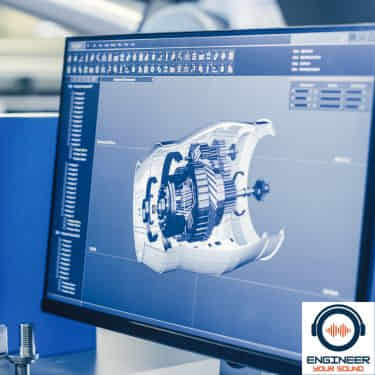As a professional who has journeyed through the complex labyrinth of Computational Fluid Dynamics (CFD), I often get asked, “Is it hard to learn CFD?”
To be honest, I feel that the answer depends on many factors, such as one’s background, determination, resources, and even luck.
As a general rule, CFD is not hard to learn. While it requires a proper understanding of fundamental fluid dynamics and some knowledge of mathematics, resources available online can help you learn CFD effectively.
In this article, I will share insights from my personal experience, discussing how long it typically takes to grasp CFD, why it’s often viewed as a challenging subject, and, most importantly, whether the journey of learning CFD is worth the effort.

Is CFD Hard To Learn?
From my perspective, the complexity of learning CFD is quite subjective. The path is significantly smoother if you have a solid foundation in mathematics and fluid dynamics. But even without such a background, don’t fret. The rigorous algorithms and complex equations that define CFD may seem intimidating initially. Still, with consistent effort, patience, and a keen desire to learn, you can gradually comprehend and master the concepts.
Relying on the vast array of resources, including online tutorials, academic papers, forums, and software documentation, can be enormously helpful for beginners.
Therefore, to label CFD as ‘hard’ would be an oversimplification. It is certainly challenging, but it’s a challenge that can be overcome with dedication and the right approach.
The best advice is to start practising CFD problems using free CFD software like OpenFOAM.
What Skills Do You Need For CFD?
The skills required to be proficient in CFD are quite diverse, reflecting the field’s multidisciplinary nature. Here are some of the key skills you need to excel in CFD:
- Understanding of Fundamental Physics and Fluid Dynamics: It’s essential to understand the underlying physics principles and fluid dynamics to build and interpret CFD models accurately.
- Mathematical Proficiency: CFD heavily relies on differential equations, linear algebra, and calculus. Therefore, having a strong mathematical background is crucial.
- Programming and Coding Skills: While not always mandatory due to the availability of commercial software, coding skills, particularly in languages like C++, Python, or MATLAB, can be incredibly beneficial, especially for customizing solvers or scripting.
- Proficiency with CFD Software: Familiarity with CFD software like ANSYS Fluent, OpenFOAM, or COMSOL is important. These programs are often used for creating and solving CFD models.
- Problem-Solving Skills: CFD often involves troubleshooting and refining models. Hence, having a good problem-solving mindset is beneficial.
- Patience and Perseverance: CFD can be complex and time-consuming. Patience and perseverance go a long way in this field.
Remember, this is not an all-exhaustive list, and depending on your specific field or role, there may be other necessary skills. But these points should provide a solid starting ground for anyone interested in embarking on a journey in the exciting world of CFD.
How Long Does It Take To Learn CFD?
The time it takes to learn CFD can vary greatly depending on the depth of understanding you aim for and the amount of time you can dedicate to learning.
As a rough estimate, if you’re starting from scratch with a basic understanding of physics and mathematics, dedicating a few hours each day, you may expect to grasp the fundamentals well in around six months.
However, to develop a deeper, more comprehensive understanding of CFD and to become proficient in its application, you’re looking at a span of one to two years.
This duration can be shorter if you’re familiar with fluid dynamics and numerical methods.
Consistency is key: CFD is a field where continuous learning and practice are essential.
Why Is CFD So Hard?
Many perceive CFD to be hard due to its multidisciplinary nature, requiring a blend of knowledge from physics, mathematics, and computer science.
To start, you need to grasp complex fluid dynamics concepts, understand intricate mathematical equations, and be comfortable with numerical methods for solving these equations.
Additionally, implementing these solutions on a computer can sometimes require coding skills, further adding to the complexity.
CFD problems often involve making approximations and assumptions, which adds another layer of difficulty in balancing precision with computational feasibility.
However, this intellectual challenge makes CFD so intriguing and rewarding for those who persist.
Is It Worth It To Learn CFD?
In my personal experience, absolutely yes, it is worth it to learn CFD. The journey is challenging, no doubt, but the rewards are significant.
Mastering CFD opens up many opportunities in various industries, including aerospace, automotive, energy, and even bio-medicine, to name just a few. The skills you acquire in CFD are highly sought-after in these domains, potentially leading to exciting and fulfilling career paths.
CFD’s application is not just limited to professional realms; it can also spur academic research and contribute to scientific advancements.
The intellectual satisfaction gained in solving complex real-world problems using CFD is immense. On a deeper level, the knowledge that your work could lead to innovative solutions that directly influence people’s lives or contribute to our understanding of the world makes the learning journey more worthwhile.
Is CFD A Good Career?
In my view, CFD indeed makes for an excellent career choice. As a CFD professional, you’ll find yourself at the intersection of physics, mathematics, and computer science, working on a myriad of challenging real-world problems.
You can work in diverse industries, ranging from automotive and aerospace to renewable energy and even the biomedical field.
There’s a high demand for CFD professionals in these sectors, translating to attractive career opportunities and remuneration.
Additionally, CFD is a field that constantly evolves, meaning there’s always something new to learn and discover. This keeps the work exciting and intellectually stimulating.
Finally, the work done in CFD can have a tangible impact on the world, whether designing efficient renewable energy systems or developing aerodynamic vehicles. The satisfaction of knowing that your work is making a difference is, in my mind, the ultimate career reward.
Final Thoughts
Computational Fluid Dynamics (CFD) is undeniably a challenging field, both to learn and to master. It requires an amalgamation of physics, mathematics, and computer science skills.
However, the journey, while demanding, is incredibly rewarding. It opens up a world of career opportunities across various industries, and the problem-solving skills you develop are highly sought-after.
Plus, the intellectual satisfaction derived from tackling real-world problems using CFD is unparalleled. So, is it worth it to learn CFD? From my personal experience, I can resoundingly say – Yes!
It might not be the easiest path, but it is filled with opportunities for growth, discovery, and significant impact in various domains.
